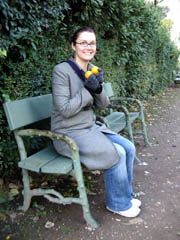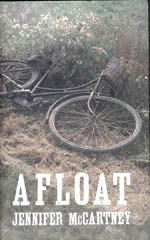Afloat
 Jennifer’s author photo shows her sitting primly on a bench, grasping two red-orange globes in gloved hands. Her novel, Afloat, gives no particular significance to tomatoes, or indeed to any other fruit, and although it was pleasing to see a young female writer who wasn’t pouting like a lingerie model – why the tomatoes?
Jennifer’s author photo shows her sitting primly on a bench, grasping two red-orange globes in gloved hands. Her novel, Afloat, gives no particular significance to tomatoes, or indeed to any other fruit, and although it was pleasing to see a young female writer who wasn’t pouting like a lingerie model – why the tomatoes?
‘I haven’t had tomatoes yet’, says Jennifer, ‘they’re oranges’. I look more closely, and realise that they do have a distinctly orange glow. Perhaps Jennifer is a fan of Jeanette Winterson? No, this is not the explanation. Jennifer was simply committing a felony. ‘They’re oranges from the Pope’s Garden’ she explains with a hint of pride, ‘I was in Rome with some friends last winter and we picked some oranges and then saw a sign which said please don’t pick these because they belong to the Catholic Church. Then my friend took this picture. I tried to eat them later but they’re sour oranges and you can’t. They were awful.’ When Jennifer needed to choose an author photo her computer had just crashed leaving her with a narrow range of options. This photo was the best of the bunch. ‘I was glad my publisher liked this one; it’s a little bit different. It’s not me behind a bookcase with Labrador and lipstick!’ It is this quiet confidence and flair that infuses Jennifer’s writing.
Set on Mackinac Island on Lake Michigan, Afloat tells the story of Bell, who works as a waitress for the summer to finance her studies. Her initial joy turns into confused sorrow as tragedy unfolds. Jennifer herself has a ‘very, very long history of doing crap jobs and being fired from them’. As well as helping to finance her literature degree, they proved excellent source material. Mackinac Island was one of her holiday jobs and she was fascinated by its old-world charm – no cars are allowed – and capitalist-fuelled, five-star luxury. From an early stage, however, she was adamant that her novel was not going to be ‘another take on how wonderful the place was’. Plenty of these books already existed, often self-published by wealthy residents, but none offered a rounded view of the island. Jennifer felt she had something to offer – Afloat would explore the stories behind the serving of five-course meals.
Most of the people Jennifer knew on the island were ‘much to weird to put in a book – more crazy than you can invent’. Her style is pared-down, her characters realistic. Caricatures with few redeeming qualities were never going to appeal, even if they were ‘real’. However, if fellow workers and guests were no use as characters, they were helpful in another way – they kick-started Jennifer to actually get writing. ‘I thought I was just like everyone else, people who wanted to be writers but were not doing anything about it.’ Also, being labeled as a waitress had a salutary effect. ‘You wash dishes and serve drinks and tell everyone that you’re going to be an actor/writer/accountant whenyou grow up. Then people smile at you, and you feel very small. Then you smile back at them and think, I’ll show you.’ However, not everyone simply wanted their ketchup as fast as possible. One guest asked Jennifer if she was a literature student majoring in creative writing. She wasn’t studying creative writing at the time, but still, it got her thinking.
Jennifer was keen to combine a masters with the experience of living in a foreign country, so applied for creative writing courses and was accepted by the University of Glasgow. ‘I lucked out in that the Glasgow programme was perfect for what I wanted’, she says, ‘it was very relaxed and all about writers helping other writers’. But why a creative writing course rather than a literature masters? ‘No reason really, except I’d find that in my English essays I’d get comments like: ‘these aren’t facts. You’ve made them up.’ I thought, maybe that’s my calling! Plus you get to live in another country. It was the best thing I could have done.’ Always the ‘dorky’ kid who liked to read, with a librarian mother who brought home all kinds of books, Jennifer had always been interested in literature and in writing. Surprisingly, though, she had never thought about writing a book. A lot of writers in Canada get their start by writing short stories, getting them published in literary journals, publishing a collection and then going on to write a novel. Consequentially, Jennifer’s eye was firmly fixed on producing a collection of short stories. Hopefully, one or two might get published in a literary journal and her slow journey on the road to authorship would begin. 
Instead, Jennifer found herself fast-tracked, courtesy of Penguin and the sensible advice of a friend who said that if she was going to spend a year writing then she should write a novel. Jennifer embarked on Afloat and the first scenes she wrote were a conversation about bath houses and a scene in which a Book Club discusses Life of Pi. This plot detail turned out to be master stroke, because it struck a chord with her soon-to-be publisher – one of the first people to publish Pi at Canongate. This serendipitous detail, however, was only one of several. With half a book written Jennifer had decided to read at Aberdeen’s Word Fest, believing that with Irvin Welsh reading on the other side of town she would be helping to entertain only a handful of people. But Welsh cost money and the up-and-coming writers were free. Their venue was packed and Jennifer was ‘terrified to read’, even though she had done readings before. The next day, she received an email from Penguin, asking her to send her book for consideration; the next email confirmed that they wished to purchase it. ‘It was surreal how it happened’ recalls Jennifer, ‘I basically skipped every step that you would normally go through and it almost makes me feel like a fraud. Maybe I should have had eighty rejection letters because that would mean I really wanted it.’
However, despite mixed feelings of disbelief and jubilation, Jennifer remained level-headed and called an agent. ‘How would you know what to expect as a first-time writer?’ she asks. The creative writing course had stressed the business side of being a writer – how the romance should not obscure the legally binding nature of contracts. So within a few days Jennifer found herself with an agent and a book deal. Penguin sensibly did not set a deadline, believing that the book should evolve organically, and Jennifer took another year to finish. ‘I write really slowly and I don’t over-write’ she explains, ‘I try and write three hundred words a day, which I will probably use in the book’.
She decided to add scenes featuring an older Bell because the island setting offered no room for reflection – her vivacious and youthful characters were unlikely to moon around asking, what is the meaning of life? Jennifer was worried that without an additional layer her book would be ‘any other about young people going off, drinking, having sex.’ She was also influenced by a number of Canadian authors, like Margaret Laurence, who wrote about women looking back at their pasts. This plot device allowed Jennifer to tell the story about what happened after the friends left the island and to speculate about the future, for in older Bell’s America there is a Mormon president. It also meant that she could convincingly show the infirmities of an old woman still obsessed by the events of a youthful summer. Bell’s obsessive remembrance is woven through the book, leaning against moments of youthful joy, providing a context through which the youthful Bell’s confusion can be examined.
Originally, Jennifer’s ending did not really tie themes together – reflecting the nature of the island, where people leave suddenly, messily. However, her agent and publisher advised against this and Jennifer added scenes to give some sense of closure. A number of her acquaintances were horrified by what they saw as people ‘interfering’ with her ‘art’. Jennifer, however, thought the advice helpful. After talking through ideas on her creative writing course she was used to accepting advice from professionals, and although the idea of the writer as ‘outsider’ is still going strong and has much to recommend it, Jennifer is happy to be social. This isn’t to say that she doesn’t share at least some similarities with the ‘writer’ stereotype. One of her favourite hobbies is reassuringly traditional: ‘I like eavesdropping a lot – it’s really good for dialogue. I go around with a notebook.’ How long have you been eavesdropping? ‘It feels like forever.’
© Hannah Adcoc

Comments